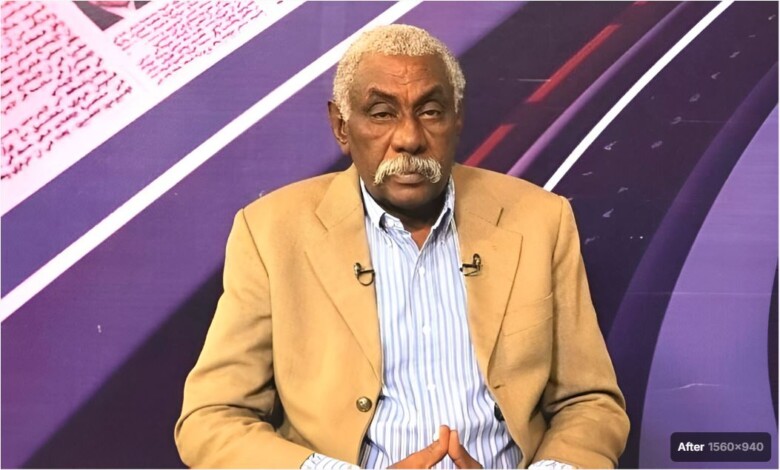Whose battle, against whom?!
Al-Jameel Al-Fadil

Yes, fortresses have fallen before this day, but now the air is sour, or bitter “over there,” or salty like the water of this sea.
Yesterday, Monday, the United Nations’ highest judicial authority rejected a lawsuit filed by Sudan against the United Arab Emirates (UAE) for “complicity in committing genocide” during the war that has been tearing the country apart for more than two years.
Indeed, the Sudanese Islamic Movement’s complaint against the (UAE), under the guise of the Sudanese State, which has been hijacked for more than three decades, is merely part of a proxy battle waged by Sudanese Islamists on behalf of the “International Organization of the Muslim Brotherhood,” the UAE’s archenemy.
Moreover, in my opinion, the Islamic Movement’s battle against the (UAE) cannot be viewed in isolation from the ongoing regional conflict between other countries in the region and the International Organization of the Muslim Brotherhood.
This conflict, which is part of a broader struggle, aims to eradicate political Islam Movements, whether Sunni or Shiite.
Surely, this is a multi-sided conflict involving the United States, Israel, as well as other Western countries, along with some Arab countries.
Therefore, I believe that the UAE thwarting an attempt to smuggle weapons into Sudan -through a cell- is part of this broader battle, in which the International Muslim Brotherhood Organization has recently been dealt strong blows. This was made rather obvious by the revelation that it was also smuggling weapons into Jordan, which has officially banned the organization and its affiliates. The ongoing situation in Tunisia also provides preludes that will inevitably lead to similar outcomes.
The Muslim Brotherhood in all these countries, including Sudan, appears to be fighting a single battle.
This may even explain how the war in Sudan, which began with a small spark, has gradually begun to escalate and expand, merging into an open, regional war that is more complex and broader in scope.
It is, in fact, a multi-sided war, now involving more than one country against political Islamist Movements in the region.
These Movements have, since their inception, been possessed by an overwhelming desire to change the entire world.
At the forefront of these Movements, of course, is the Sudanese Islamic Movement, which has entangled the country in this treacherous path with major terrorist crimes, the least of which wasn’t the bombing of the embassies in Dar es Salaam and Nairobi, the attack on the USS Cole, and the attempted assassination of former Egyptian President Hosni Mubarak in Addis Ababa.
In any case, this Movement has a long history of interfering in the affairs of others, through its involvement in changing regimes and governments in neighboring countries, from Chad in the west to Ethiopia and Eritrea in the east.
More importantly, this is the same Movement that is now lamenting and complaining about foreign interference in its struggle against the revolutionary forces seeking to liberate the country from the grip and hegemony of the “International Muslim Brotherhood Organization.”
However, strangely, this Movement, despite its history of disrespecting the Sovereignty of States, is unashamed -today- to accuse the (UAE), Chad, and Kenya of violating its Sovereignty —or rather, the sovereignty of the “International Muslim Brotherhood Organization,” which has continued to occupy or colonize the country.
Thus, this war is no longer, in reality, a war between two internal parties vying for power. It has become part of a broader war seeking to eradicate political Islam from Gaza to Tunis, from Amman to Tehran, from Khartoum to Beirut, and from Damascus to Sana’a.
Recently, two attacks targeting highly geopolitically sensitive airports were noteworthy: the first of which is, Ben Gurion Airport, and the second, Port Sudan Airport.
Despite the geographical distance and the apparent difference in the nature of the conflict, there are threads that may link the two events, reflecting a qualitative shift in the tools of regional conflict and its political and military ramifications.
Targeting such airports confirms the escalating use of long-range missiles and drones in symbolic and moral wars, to undermine the sense of security and convey political messages.
In such wars, drones carry not only gunpowder but also political messages.
The drone is no longer just a small, unmanned aircraft, manipulated by the wind.
The drone has indeed become a symbol of shifting the balance of power on the battlefield, thanks to its astonishing capabilities to shorten long distances, conceal itself, maneuver, and reduce or neutralize any impact on the ground, whether armor or infantry.
In general, the drone has become one of the most important tools of contemporary warfare, offering precision, low cost, and reduced human risk.
Yes, it performs the same mission of “killing,” “ravaging,” and “devastating,” but without political, legal, or social side effects.
The drone, whatever the case, is ultimately a machine, untainted by any suspicion of human psychological illness. It strikes without malice, hatred, or envy.
Perhaps because it has absolutely no whims or ambitions, seeking to satisfy them through “stealing,” rape, or any other means that achieves the ultimate goal of humiliating opponents and degrading the dignity of enemies.
In truth, all air power, especially drones, come across -to me- as more humane and less abusive than ground forces, which can harass their enemies as they please, whenever they are captured.
Nonetheless, I believe that drones and long-range missiles are no longer limited to being mere offensive tools; they have become part of the geopolitical equation in protracted conflicts.
The greater the reliance on low-cost military technology, the more civilian fronts become a direct target for conflicts that may begin locally but eventually spiral into international dimensions.




